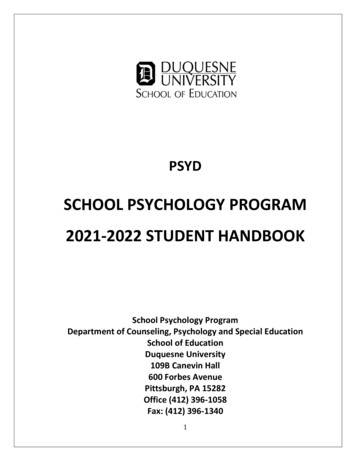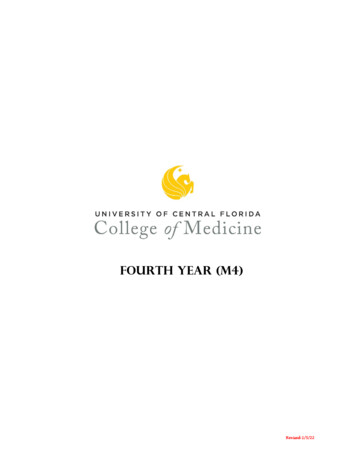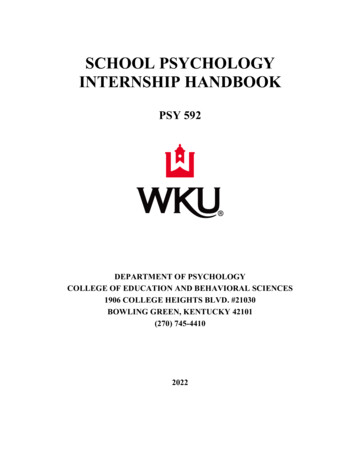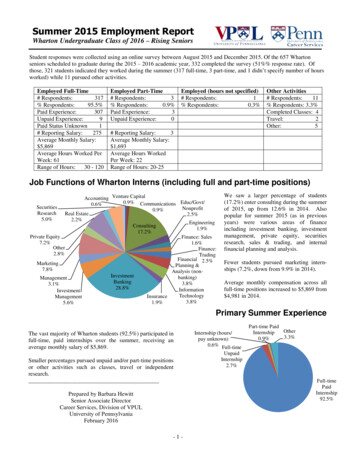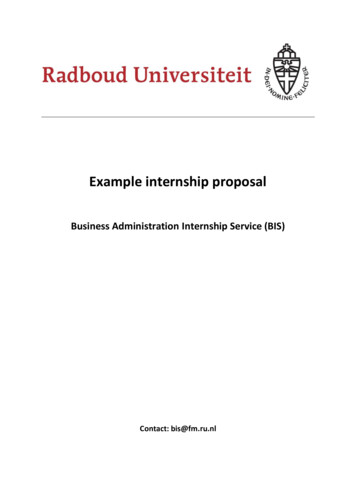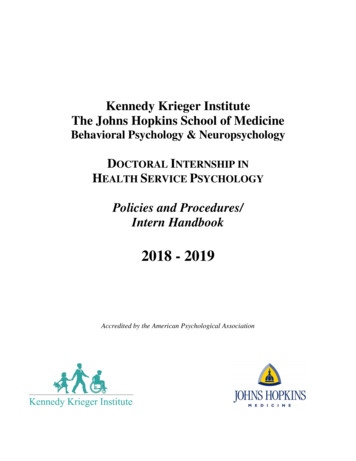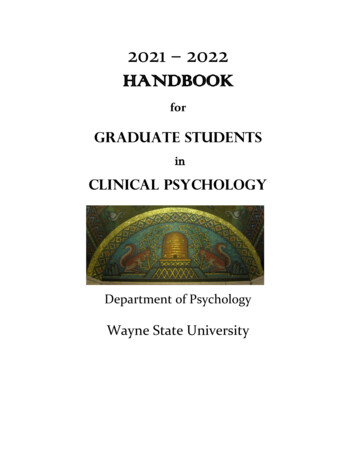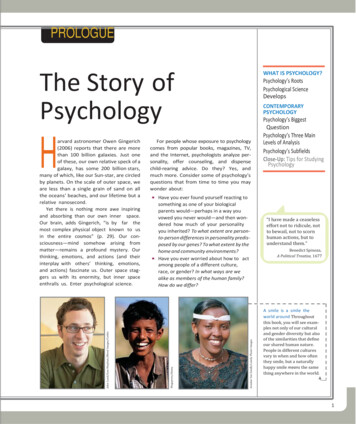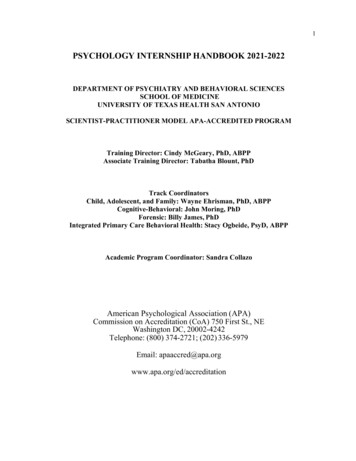
Transcription
1PSYCHOLOGY INTERNSHIP HANDBOOK 2021-2022DEPARTMENT OF PSYCHIATRY AND BEHAVIORAL SCIENCESSCHOOL OF MEDICINEUNIVERSITY OF TEXAS HEALTH SAN ANTONIOSCIENTIST-PRACTITIONER MODEL APA-ACCREDITED PROGRAMTraining Director: Cindy McGeary, PhD, ABPPAssociate Training Director: Tabatha Blount, PhDTrack CoordinatorsChild, Adolescent, and Family: Wayne Ehrisman, PhD, ABPPCognitive-Behavioral: John Moring, PhDForensic: Billy James, PhDIntegrated Primary Care Behavioral Health: Stacy Ogbeide, PsyD, ABPPAcademic Program Coordinator: Sandra CollazoAmerican Psychological Association (APA)Commission on Accreditation (CoA) 750 First St., NEWashington DC, 20002-4242Telephone: (800) 374-2721; (202) 336-5979Email: apaaccred@apa.orgwww.apa.org/ed/accreditation
2Section1.2.3.4.5.6.7.8.9.10.ContentPROGRAM OVERVIEWCLINICAL PSYCHOLOGY INTERNS LISTOVERVIEW OF TRAINING YEAR AND LEAVE POLICIESSCHEDULES AND SUPERVISORS Site Rotations by Track Group Therapy/PCIT Assignment Mentor and Advance Clinic SupervisorsSEMINARS Tuesday Morning Seminar Tuesday Lunch Schedule Track-Specific SeminarsHOLIDAY SCHEDULEPROGRAM FORMS Weekly Supervision Logs Leave Application FormsEVALUATION FORMS Competency Assessment Form Psychology Site Evaluation Form Psychology Interns’ Evaluation of Supervisor Mentor Evaluation Form Seminar Evaluation Form Rubrics for Zuelzer Psychology AwardsSITE TRAINING PLANSINTERNSHIP AND UNIVERSITY POLICIES Vacation Statement Professional Work Relationships Moonlighting Policy Diversity Policy UTHSCSA Handbook of Operating Procedures Non-Discrimination in the Workplace Title IX Sexual Harassment/Sexual Misconduct Request for Accommodations under ADA Reporting Compliance Concerns Management of Training Deficiencies, Failures, and Program Terminations Progressive Disciplinary Action Procedures for Dismissal of Employees UT Health Grievance Policy and Procedures Internship Grievance Policy and Procedures Appic’s Guidance on Maternity 62646571102106108110114117119121
3PROGRAM OVERVIEWOur internship in clinical psychology is designed to provide an intensive American PsychologicalAssociation-accredited (Commission on Accreditation, 750 First Street N.E., Washington, D.C.,20002- 4242, Telephone 202-336-5979) clinical internship training experience.* The Department ofPsychiatry and Behavioral Sciences is the coordinating agency for the development and operation ofthe training program in clinical psychology. The faculty as a whole participates in the internshipprogram. The Psychology Internship Training Committee serves as the major forum for ongoingdiscussion of the training program and formulates recommendations for program development.GENERALIST PROGRAM. Clinical psychology training at the University of Texas Health SanAntonio provides generalist training involving a full array of patients (children, adolescents, adults)seen in diverse treatment settings (inpatient, outpatient, and community organizations) receiving a fullspectrum of psychological evaluations (interview and test based) and interventions (individual, family,and group). Our program is characterized by a scientist-practitioner training philosophy as outlined bythe Boulder Conference and the following aims: breadth of training, intensive supervision, practice andscience of applied psychology, and ethical and sensitive practice to individual and cultural differences.Over the course of the year, our interns receive at least 4 hours of weekly clinical supervision with atleast two of these hours consisting of individual supervision. Throughout the year, our interns areexposed to multiple theoretical orientations, including behavioral, cognitive-behavioral, systems,interpersonal, and psychodynamic.During the yearlong internship, interns participate in major rotation(s) as well as several year-longclinical activities, including on-going individual therapy cases through our Advance PsychotherapyClinic and either co-leading group therapy or providing Parent Child Interaction Therapy (PCIT).Additionally, interns attend weekly seminars and didactics designed to enhance their understanding ofthe scientist-practitioner model, evidence-based practice, integrative assessment, supervision, andethics/diversity. Finally, interns can design and implement a program improvement project during thetraining year as it is applicable for their site and based upon supervisor approval.TRACKS. Our program strives to provide training that has depth as well as breadth. We have attemptedto accomplish this balance through a track system, which was first implemented during the 2014-2015training year. The track system provides applicants with stronger assurance of the training experiencesthey will receive when they arrive. The UT Health San Antonio Internship offers four tracks (Child,Adolescent, and Family; Cognitive-Behavioral; Forensic; and Integrated Primary CareBehavioral Health).*Questions related to the program's accredited status should be directed to the Commission onAccreditation: Office of Program Consultation & Accreditation American PsychologicalAssociation 750 1st Street, NE, Washington, DC 20002. Phone: (202)336-5979 / E-mail:apaaccred@apa.org. www.apa.org/ed/accreditation
4CLINICAL PSYCHOLOGY INTERNSChild, Adolescent, and Family TrackIntern NameIntern’s email addressPhone NumberUniversityDirector of Clinical TrainingIntern NameIntern’s email addressPhone NumberUniversityDirector of Clinical TrainingCognitive-Behavioral TrackIntern NameIntern’s email addressPhone NumberUniversityDirector of Clinical TrainingIntern NameIntern’s email addressPhone NumberUniversityDirector of Clinical TrainingIntern NameIntern’s email addressPhone NumberUniversityDirector of Clinical TrainingIntern NameIntern’s email addressPhone NumberUniversityDirector of Clinical TrainingIntern NameIntern’s email addressPhone NumberUniversityDirector of Clinical TrainingForensic TrackIntern NameIntern’s email addressPhone NumberUniversityDirector of Clinical TrainingIntern NameIntern’s email addressPhone NumberUniversityDirector of Clinical TrainingIntegrated Primary Care Behavioral Health TrackIntern NameIntern’s email addressPhone NumberUniversityDirector of Clinical TrainingIntern NameIntern’s email addressPhone NumberUniversityDirector of Clinical Training
5OVERVIEW OF PSYCHOLOGY INTERNSHIP: 2021-2022 TRAINING YEARTRAINING PHILOSOPHYThe University of Texas Health San Antonio Psychology Internship Training Program is an APAaccredited psychology internship program (accredited through 2023) that supports a scientistpractitioner model.PROGRAM AIMS1.BREADTH OF TRAINING. As applied psychology expands to encompass many newareas, clinical psychologists need to be trained in a broad variety of skills rather than any singlespecialty. A good program should be comprehensive in scope.As a generalist program, we are able to provide our interns with a wide range of training activitiesincluding intake work, assessments, as well as group, individual, and family psychotherapy. Internsprovide care for diverse patient populations including adults, adolescents, and children with a widerange of presenting problems. A significant percentage of the patients served come fromunderserved urban areas. Approximately 50 to 60 percent of the training experiences involveservices to minorities (primarily Hispanic), though there are also opportunities for work withVeteran and military populations at some sites. In addition to clinical care, we have provided internswith opportunities for involvement in applied clinical research and/or process improvementactivities.2.INTENSIVE SUPERVISION. A second major point is the importance of close andcareful monitoring of each intern's experience with useful feedback to the intern. The content andtiming of evaluations is set to maximize a student's growth. This implies a close individualinvolvement in each student's progress by faculty and supervisors.Interns’ work is intensively supervised on an individual basis, with each intern scheduled for aminimum of four hours per week of supervision. Most supervision is provided by the psychologyfaculty. Interns may also have the opportunity to work with and receive feedback from psychiatryfaculty and social work staff.3.PRACTICE AND SCIENCE OF APPLIED PSYCHOLOGY. Quality clinicalinternship training should impart skills that focus on both the process and science of psychologicalwork.The Clinical Psychology Internship was established in 1970 with the faculty at that time making aphilosophical commitment to the "scientist-practitioner model," emphasizing the practitioner sideof the Boulder model. The internship year is seen as a time to emphasize first-hand experienceswith clinical involvement under intense individual supervision by faculty who demonstrate clearand visible scientific and professional interests.
6Psychology interns receive year-long education designed to help strengthen their understandingand skill in assessment and psychotherapeutic process. Our students also learn the fundamentals ofoutcome evaluations and use of available scientific principles and data to guide their selection ofclinical interventions and help them learn to evaluate and evolve their clinical practice.4.PRACTICE ETHICALLY AND WITH SENSITIVITY TO INDIVIDUAL ANDCULTURAL DIFFERENCES. All psychologists should be able to practice ethically and withsensitivity to cultural and individual differences that impact their clinical and professionalactivities.The Internship program has made systematic and long-term efforts to attract interns and staff fromculturally diverse backgrounds, including diversity across age, disability, ethnicity, genderexpression, gender identity, language, national origin, race, religion, culture, sexual orientation,and socio-economic background. These efforts have resulted in the admission of culturally diverseinterns and supervisors. The internship sites have a training environment that is sensitive and showsrespect for individual and cultural diversity.The psychology training program values diversity and evaluates interns on multiculturalcompetencies. The internship has a series of diversity didactics during the year, and interns havenumerous opportunities for supervised experiences in clinical services delivered to an ethnicallyand culturally diverse client population within San Antonio and the surrounding communities (over60% of the population in this area is Hispanic). The internship provides routine discussion ofdiversity issues within the context of clinical supervision and formal didactic seminars.In 2020, the internship formed the Committee on Diversity, Equity, and Inclusion to ensure thatthe training program fosters a work environment that supports the individual and culturaldifferences of our interns, staff, faculty, and patients. During the 2020-2021 internship year, thecommittee received a small grant from APPIC to support the development and dissemination of apolicy on handling patients’ discriminatory behaviors towards trainees. Interested interns areencouraged to join the committee; however, participation is completely voluntary. Meetings areheld on the second Tuesday of each month at 1 pm.SUPERVISION REQUIREMENTS AND EVALUATIONS1. Each intern is required to receive a minimum of 4 hours of supervision per week. At least twoof these hours will consist of individual supervision by a licensed psychologist. Interns arerequired to complete a weekly supervision log. The training directors monitor supervisionhours weekly. It is the responsibility of the intern to talk to their site supervisors if they arenot receiving the required weekly supervision hours. If the intern is not able to rectify theshortage of supervision hours with their site supervisor directly, the training directors willmeet with intern and site supervisor to ensure that appropriate supervision is being provided.2. Each clinical assignment (e.g., primary rotation site, Advance Clinic, year-long group) willhave a designated faculty supervisor. It is the responsibility of the supervisor of each activityto provide ongoing supervision and evaluative feedback to the intern assigned to him/her.
73. In order to help improve the accuracy of the evaluative feedback, supervisors for the majorsite rotations and the year-long training activities provide direct observation or conduct avideo/audio review of the intern’s clinical work each evaluation quarter. Interns are expectedto meet with their supervisors early in the evaluation period to develop a plan to ensure thatdirect observation/audio/video review occurs quarterly.4. In addition to ongoing, informal feedback, the supervisor completes a formal, writtenevaluation of the intern’s clinical work each quarter. The supervisor is expected to meet withthe intern to review their evaluation. The format of this meeting rests with the supervisor butshould include an open discussion of the ratings with the intern and corrective feedback whereapplicable.5. Evaluations by interns and faculty should stress proposed corrective action.6. These evaluations should be written, discussed, with a copy given to the intern. Both internand supervisor will make comments about the evaluation feedback session and sign theevaluation form. A copy will also be placed on file with the training directors.7. The intern will also provide his/her mentor the evaluation and feedback that he/she hasreceived from each of his/her supervisor.8. Informal evaluations of the interns will be presented to the training committee during monthlymeetings. Formal evaluations of the intern will be presented to the training committeequarterly.9. Evaluative feedback of the intern’s progress will be shared with his/her doctoral program afterhis/her six-month evaluation and at the end of the internship year.10. Interns will be asked to evaluate Tuesday morning seminars throughout the year. Interns willalso evaluate each supervisor, mentor, and rotation at the conclusion of the training experience.These evaluations will be turned into Sandy Collazo, the program administrator, who willplace the evaluations in a sealed envelope. Program evaluations will not be examined by thefaculty until after the internship year has ended.MENTORS1. Each intern is assigned a mentor to provide continuity, clarification, and coordination of thetrainees' experience.2. The mentor chosen, when possible, has additional supervisory responsibilities for the intern.Except under extraordinary situations, faculty with less than one year's experience in theprogram will not serve as mentors.3. The mentor will schedule time to meet with the intern. In the beginning of the year, meetingsmay happen weekly but can decrease in frequency as the year progresses.
84. Quarterly, the mentor will lead a faculty discussion of his/her mentee and obtain a consensusof the faculty's views during the internship training committee meeting. The InternshipDirector or Associate Director will write the home graduate school regarding evaluation afterthe mid-year and end-of-year evaluation.5. The Internship Director or Associate Director, with input from the mentor, will write a finalevaluation at the end of the internship year reflecting a consensus of the faculty's views. This finalevaluation is discussed with the intern and will be sent to the intern's graduate school.6. Should an intern and/or mentor (or supervisor) feel that their working relationship isunproductive, they should discuss this with the training directors. The directors will attemptto facilitate the relationship between mentee and the mentor (or supervisor). If this isunsuccessful, a change in intern/mentor (or supervisor) assignment can be made.TELESUPERVISIONRationale: Due to the COVID-19 Pandemic, telesupervision was expanded in order to protect thesafety of both our interns and faculty while also meeting our training goals and curriculum. Postpandemic, video supervision will continue to be utilized in the rare circumstance where thesupervisor is located at a UT Health San Antonio satellite location. With a large internship,allowing supervisors from UT Health San Antonio satellite locations to supervise our interns helpsensure that the internship can provide more than the requisite 4 hours of supervision per week toour interns. Additionally, the use of telesupervision allows our interns to interact with diversesupervisors across the UT System and increases the likelihood that our interns can receivesupervision in Spanish. Finally, telesupervision allows interns and supervisors to navigaterelational and technological issues that can arise with the use of telehealth platforms. This isparticularly relevant due to the increase in telehealth services offered at UT Health San Antonio asa result of COVID.Consistent with Training Model: This policy remains in line with our current program aims andtraining outcomes by providing intensive supervision to our interns even if that cannot occur inperson (particularly due to COVID). Telesupervision also meets the aims of our program byallowing our interns to interact with diverse faculty across the UT System that they would not beable to interact with if telesupervision was not an option.How Utilized: When employed, video supervision is utilized for one hour of individual supervisionwithin the Advance Clinic (minor rotation). Telesupervision does not account for more than onehour of the minimum required two weekly hours of individual supervision and two hours of theminimum required four hours of total weekly hours of supervision. Our interns generally receiveat least five hours of weekly supervision (3 individual/2 group) so telesupervision is being used inaccordance with the SoA’s guidelines and limits on telesupervision.Which Trainees: Telesupervision is allowed for all trainees. Normally, this type of supervisiononly occurs occasionally within the Advance Clinic. However, due to COVID-19, this type ofsupervision has been utilized more frequently, and it is anticipated that this will continue to be thecase over the course of the pandemic and post-pandemic. This is particularly true for training sites
9that have incorporated more telehealth options for treating patients due to COVID-19 or have spaceissues that makes it difficult to follow CDC guidelines regarding social distancing.Establishing Relationships: To promote the establishment of a positive relationship at the onsetof the supervisory experience, long-distance supervisors are invited to the Psychology InternshipOrientation to meet with their supervisees in-person (while social distancing). The supervisors alsomeet in-person with the intern throughout the year when they travel to the UT Health San Antoniomain campus. Additionally, all supervisors are encouraged to contact their supervisees through email prior to the internship year beginning to develop a relationship.Professional Responsibility: Because long-distance supervisors are UT Health San Antoniofaculty, they have access to the electronic medical record (EPIC) that is used in the Advance Clinic.Long-distance supervisors sign off on all patient contacts ensuring professional responsibility forthe clinical cases.Non-Scheduled Consultation/Crisis Coverage: An intern is encouraged to call or email his/hersupervisor in times of needed non-scheduled (non-emergency) consultation. The supervisor willreach out to the intern to schedule a time to discuss the case over and above regularly scheduledsupervision. In cases of emergency, the Advance Clinic’s Director (David Hunter) is contacted.This is the policy for all Advance Clinic patients regardless of who is supervising the case. Dr.McGeary and Dr. Blount are also on site while the interns are seeing Advance Clinic patients sothey are also able to consult and provide crisis coverage in emergency situations.Privacy/Confidentiality: Interns are provided a private office to contact their supervisor withinthe Advance Clinic. Interns and faculty are also able to do this within the privacy of their ownhomes. Interns and faculty also utilize a HIPAA compliant Zoom line for supervision calls.Technology & Quality Requirements: The UT Health San Antonio Clinical PsychologyInternship Program is utilizing a HIPAA compliant Zoom line for telesupervision. Zoom is veryintuitive; however, if faculty or interns need training on how to use Zoom, the Training Directorswill meet with the intern or faculty individually to train on the use of the platform.ONGOING PSYCHOTHERAPY1. Each intern will carry 1-2 individual long-term psychotherapy cases for the training yearwithin the Advance Clinic. This is in addition to the caseload at the interns’ primary site.2. Supervisors for the Advance Clinic are assigned by the training directors. (See schedule.)3. Each intern will be assigned a long-term group experience or will be trained in Parent-ChildInteraction Therapy. (See schedule.)4. The supervisors for the long-term adult groups varies based upon the group the intern isleading. (See schedule.)
10SEMINARSInterns are expected to attend and participate in all required general (Tuesday morning) and trackseminars (see list of seminars in sections below). The general Tuesday morning seminar startspromptly at 8:15 am. Since the internship relies on volunteer presenters, please be on time,attentive, and polite. Active participation is expected. Attendance of these seminars will be taken.Participation in these seminars will be part of the intern evaluation process.Interns may attend elective seminars offered through the Department of Psychiatry and BehavioralSciences with permission from the internship directors and track supervisors (Child, Adolescent,and Family: Dr. Ehrisman; Cognitive-Behavioral: Dr. Moring; Forensic: Dr. James; IntegratedPrimary Care Behavioral Health: Dr. Ogbeide).Once a month, all interns will participate in a cross-track Peer Supervision Seminar. This will occuron the first Tuesday of each month from 12:00-1:00 pm. Each intern is required to present at leastone case during the year.RESEARCH QUALITY IMPROVEMENT DAY AND RESEARCH AWARDEach year, the Department of Psychiatry and Behavioral Sciences hosts a Research and QualityImprovement Day (RQID). Each intern is required to submit at least one poster presentation.Alternatively, they can submit an abstract for an oral presentation, which will be considered in theselection of the Research Day Ground Round student speakers. Research Day is contingent ondepartmental funds being available. Further information about Research Day will be provided overthe course of the year.CLINICAL AND RESEARCH INTERN OF THE YEAR AWARDDependent on departmental funding, one intern will be the recipient of the Margot ZuelzerPsychology Clinical Intern of the Year Award and one intern will be the recipient of the MargotZuelzer Psychology Research Intern of the Year Award. These interns will be selected by theInternship Training Directors based upon scholarship and clinical commitment during theinternship year as well as exhibiting an open attitude toward life-long learning that is consistentwith Dr. Zuelzer’s view of psychology. The Clinical Psychology Internship Program will providethe interns with a plaque as well as exhibiting a plaque outside the Clinical Psychology InternshipProgram education office with a list of interns’ names who have received the award. The trainingdirectors will consider the following areas of scholarship and clinical commitment in theirselection: patient care, presentations, publications, grant applications, successful completion ofdissertation, continuing education, and committee/organization membership. Ethical andprofessional behaviors, level of participation in seminars, and contribution to the cohort will alsobe factors considered during the selection process. Interns who are placed on informal or formalremediation will not qualify for the award. Rubrics for these awards is provided on pages 62-67.
11FINANCIAL AND OTHER BENEFIT SUPPORTThis 12-month, full-time internship pays an annual salary of 27,500. Paychecks will be issued bythe University of Texas Health San Antonio at the beginning of each month starting in August. UTHealth San Antonio also provides employees access to individual medical insurance at no cost.Medical insurance coverage of dependents, legally married partners, or domestic partners withdeclaration of informal marriage documentation may be purchased by the intern. Interns, who arestudent affiliates of the American Psychological Association, also receive paid malpracticeinsurance during their year of employment. Additional benefits provided by the program include 500 support for professional development (e.g., attending psychology conference) and 100 forprofessional books and/or treatment manuals. Program-provided benefits (i.e., professionaldevelopment and library funds) are dependent on the availability of departmental funding and arenot guaranteed. Professional development activities and professional books must be pre-approvedby the training directors in order for interns to receive reimbursement.LEAVE POLICYEach intern will have 12 days of vacation leave, 3 floating holidays, up to 12 days sick leave, andup to 5 days of administrative leave. Vacation is to be split equally between the first and secondhalf of the year. No more than 5 days of leave will be approved at the end of June. All vacationsmust be approved by the clinical site, mentor, and the training directors no later than 30 days inadvance. Leave requests need to be submitted directly to Ms. Sandra Collazo (do not place in Dr.McGeary's box). Completed (i.e., signed by all respective supervisors) leave forms must bereceived 30 days prior to leave. If not received in time, leave will NOT be approved (unless thereare extenuating circumstances, e.g. death of a loved one).Sick leave can only be used for medical appointments, medical procedures, or illness of theintern or his/her dependent. Per the institutional Handbook of Operating Procedures (HOP), anyintern who takes 3 or more consecutive days of sick leave will be asked to provide medicaldocumentation with his/her leave form. Similarly, if a pattern of absences emerges (e.g., alwayssick on Tuesday or Friday) with sick leave, then interns will be asked to provide medicaldocumentation.Please do not schedule medical appointments during the Tuesday morning seminars. Interns needto email their respective site supervisors in addition to Sandy Collazo and Drs. McGeary and Blountas early as possible when he/she will not be attending work due to illness. When an intern is sickon a Tuesday, the intern is responsible for contacting the Advance Clinic to reschedule patients.Sick leave forms must be submitted (signed by either Dr. McGeary or Dr. Blount and the sitesupervisor) directly to Sandra Collazo. Interns who fail to submit sick leave will be counseled ontheir professionalism. For continued problems with leave, a remediation plan may be initiated.Successful completion of an APA-accredited internship requires a minimum of 2000 hours peryear. Consequently, interns are expected to participate actively in their training activities.Exceeding the leave parameters established may result in extending your internship year past June30th to ensure that the requirements for internship are met. Interns will not receive financialcompensation or benefits past June 30th.
12HOLIDAY. WEATHER AND COMPENSATORY POLICYHolidays- All UT Health San Antonio Holidays are to be observed. If the intern works at a clinicalsite on a UT Health San Antonio Holiday, then Administrative Time will be credited per hour tothe intern only with prior written approval from the Internship Directors. If a clinical site observesa holiday during a non-UT Health San Antonio Holiday, then the intern must either come to theUT Health San Antonio Campus to work or take a day of vacation leave.Inclement Weather: If a work day is cancelled at UT Health San Antonio due to inclement weather,then time spent at a clinical site may be credited to the intern per hour as Administrative Leave(with permission from the Internship Director), UT Health San Antonio Interns are not eligiblefor Compensatory time, and Compensatory or Administrative time will never be given for trainingrelated activities (i.e., working 10 hours instead of 8). Typical work weeks are expected to rangefrom 45-55 hours.MAINTENANCE OF RECORDSThe program maintains a permanent record of interns’ training experiences during their internshipyear. The contents of these records include but is not limited to the following items: the intern’sAAPI, the internship contract/welcome letter, quarterly evaluations, communication with theintern’s doctoral program, remediation plans (as needed), and certificate of completion. The contentof these records is considered confidential and are securely maintained. Access to these records islimited to internship leadership. However, individual records may be reviewed by the trainingcommittee, university leadership, or representatives of the internship’s accrediting body (i.e., APACOA).Interns are strongly encouraged to maintain a record of their own, including keeping a copy of theirCertificate of Completion for future use (e.g., licensure, credentialing). However, interns mayrequest copies of the documents maintained in their permanent record through written request tothe training directors. Requested documentation will be provided within two weeks of a writtenrequest.
13SCHEDULES AND SUEPRVISORS: SITE ROTATIONS BY TRACKChild, Adolescent, and Family TrackMajor Rotation 1Supervisor(s)July 2021-Dec 2021Intern #1Intern #2Major Rotation 2Supervisor(s)Jan 2022-June 2022Clarity Child Guidance CenterClarity Child Guidance CenterEsseryEsseryClarity Child Guidance CenterClarity Child Guidance CenterEsseryEsseryMajor Rotation 2Supervisor(s)Cognitive-BehavioralMajor Rotation 1Supe
OVERVIEW OF PSYCHOLOGY INTERNSHIP: 2021-2022 TRAINING YEAR TRAINING PHILOSOPHY The University of Texas Health San Antonio Psychology Internship Training Program is an APA-accredited psychology internship program (accredited through 2023) that supports a scientist
